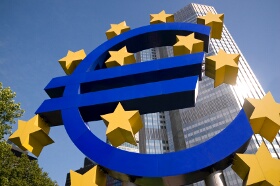
The euro fell against the US dollar and the Japanese yen but gained on other most-traded counterparts today. The economic sentiment both in Germany and the whole eurozone deteriorated this month yet was better than analysts had predicted.
The ZEW Indicator of Economic Sentiment for Germany dropped from 10.2 to 1.0 in February but was above the median forecast of 0.1. The report commented on the result:
The looming slowdown of the world economy and the uncertain consequences of the falling oil price put a strain on the ZEW Indicator of Economic Sentiment.
The ZEW Indicator of Economic Sentiment for the eurozone also declined, falling from 22.7 to 13.6 yet also staying above the consensus forecast of 10.3.
While the euro fared relatively well against the majority of its most-traded peers, the important negative factor for the currency remain prospects for monetary easing. Mario Draghi, President of the European Central Bank, was sending strong signals that he is ready to loosen the already extremely accommodative monetary conditions. This does not bode well for the shared currency of the eurozone.
EUR/USD ticked down from 1.1153 to 1.1142 as of 20:25 GMT today after rising to the high of 1.1193 intraday. EUR/JPY dropped from 127.79 to 126.90. At the same time, EUR/GBP rallied from 0.7726 to 0.7798.
If you have any questions, comments or opinions regarding the Euro,
feel free to post them using the commentary form below.